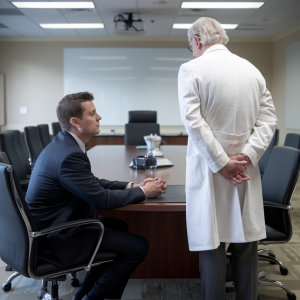In complex injury disputes, expert witnesses play a pivotal role in determining the outcome of legal cases. One of the most crucial roles in this area is that of the anesthesiology expert witness. These experts bring specialized knowledge to cases involving pain management, anesthesia complications, and medical procedures. Their testimony can make a significant impact on whether a case is won or lost.
Anesthesiology expert witnesses help clarify complex medical details for judges and juries who may not have a background in medicine. Their expertise is particularly valuable in cases involving anesthesia-related injuries, malpractice claims, or personal injury disputes.

What Is an Anesthesiology Expert Witness?
Definition and Qualifications of an Anesthesiology Expert Witness
An anesthesiology expert witness is a medical professional who specializes in anesthesia and pain management. These experts are typically board-certified anesthesiologists with years of clinical experience and often have advanced training in areas such as pain management or critical care medicine.
To serve as an expert witness, an anesthesiologist must possess:
- Board certification in anesthesiology.
- Extensive clinical experience in anesthesia practices.
- A record of academic contributions or teaching in anesthesiology.
- Familiarity with the legal process and the ability to communicate complex medical concepts to non-medical individuals, like juries or judges.
These qualifications ensure the expert’s opinions are credible and reliable in court.
The Role of Anesthesiology Experts in Legal Cases
An anesthesiology expert witness provides insight into the standard of care in anesthesia administration, evaluates potential breaches in that care, and assesses the extent of harm caused by anesthesia-related complications. Their role is to:
- Explain anesthesia procedures in detail.
- Assess whether the standard of care was followed during the procedure.
- Testify on the impact of anesthesia on the injury or death in question.
In legal disputes, these experts bridge the gap between complex medical issues and the court’s need for clarity.
Common Types of Cases Involving Anesthesiology Experts
Medical Malpractice Lawsuits
Anesthesiologists are often called upon in medical malpractice cases to assess whether there was negligence in the administration of anesthesia. A common scenario in these cases is when a patient suffers complications during or after surgery, such as brain injury, nerve damage, or even death, that may be attributed to errors made during anesthesia management.
The expert witness reviews:
- Whether the correct dosage and anesthesia techniques were used.
- If the patient’s medical history was adequately considered.
- Whether the monitoring equipment functioned as expected during the procedure.
Personal Injury Claims
Personal injury claims involving anesthesia typically focus on long-term pain, disability, or complications stemming from an incident. For example, someone might suffer complications from anesthesia used during an accident-related surgery.
An anesthesiology expert helps:
- Evaluate whether the injury was caused or exacerbated by anesthesia.
- Assess the lasting effects of anesthesia-related pain.
- Determine the connection between the anesthesia procedure and the resulting physical or emotional trauma.
Workers’ Compensation Disputes
In workers’ compensation cases, employees may claim that their injuries were worsened due to mistakes made during anesthesia administration, or they may dispute the level of compensation based on the severity of their pain or disability.
An anesthesiology expert witness may:
- Review medical records to determine the extent of injury.
- Offer an opinion on whether the patient’s disability is related to an anesthesia-related error.
- Assess the long-term impact of the anesthesia on the worker’s ability to return to their job.
Key Responsibilities of an Anesthesiology Expert Witness
Providing Testimony Regarding the Standard of Care in Anesthesiology
The standard of care is a legal benchmark that ensures medical professionals meet acceptable levels of skill and competency. An anesthesiologist expert witness helps determine whether a healthcare provider’s actions were consistent with the accepted practices in the field. This includes reviewing preoperative assessments, anesthesia administration, and postoperative care.
Some areas an expert might address include:
- Was the right type of anesthesia chosen for the patient?
- Was the anesthesia administered correctly during surgery?
- Were appropriate monitoring tools used to track the patient’s vital signs?
Offering Opinions on Causality and Injury Severity
One of the most critical roles of an anesthesiology expert witness is to determine the causal relationship between the anesthesia used and the resulting injury or complications. In many cases, this can be a challenging task, as the effects of anesthesia are not always immediately apparent.
The expert might:
- Explain the medical mechanisms behind specific anesthesia-related injuries.
- Determine whether the injury or complication is likely to have been caused by anesthesia, or if it resulted from other factors.
- Offer opinions on the severity and long-term implications of the injury.
Reviewing Medical Records and Offering an Expert Analysis
An anesthesiologist expert will often review the medical records of the case, including anesthesia logs, patient history, and surgical reports. They will scrutinize these documents to identify inconsistencies or evidence of medical errors.
This expert analysis can be pivotal, as the expert might find details that challenge the plaintiff’s claims or validate the defendant’s version of events. This type of thorough record review allows the expert to provide solid opinions backed by evidence.

The Process of Engaging an Anesthesiology Expert Witness
How to Find a Qualified Anesthesiology Expert
Finding the right anesthesiology expert witness for a legal case is not as simple as picking the first name on a list. It’s crucial to select someone with the right credentials, experience, and expertise in the specific area of anesthesiology related to your case.
Here are some tips to help you find a qualified expert:
- Look for Board-Certified Anesthesiologists: Ensure the expert is board-certified in anesthesiology. This confirms that they have passed rigorous exams and met high standards in their field.
- Consider Subspecialties: Depending on the nature of the case, you may need an expert who specializes in pain management, critical care, or pediatric anesthesiology.
- Review Experience and Reputation: Look for experts who have extensive experience testifying in court, as their ability to communicate complex concepts clearly is critical.
- Check References: Reach out to other attorneys or professionals who have worked with the expert to gauge their reliability and effectiveness.
A skilled anesthesiologist with a track record of successful court appearances will be more likely to present testimony that holds up under cross-examination.
The Expert Witness Selection Process
Once you’ve identified a list of potential candidates, the next step is the selection process. It’s essential to choose someone who can not only speak to the medical aspects of the case but also explain those details in an understandable and compelling manner.
Here’s what to consider during the selection process:
- Interview the Expert: Set up an initial meeting with the expert to discuss their background, approach to cases, and previous testimony experiences.
- Evaluate Communication Skills: Since legal proceedings require testimony to be understandable to laypersons, assess the expert’s ability to explain complex medical topics in simple terms.
- Assess Objectivity: Ensure that the expert will remain objective and offer an honest assessment, regardless of the side they are hired to represent. An expert witness should not be biased.
- Confirm Availability: Make sure the expert is available for the length of the case and can attend trial if necessary.
A well-chosen anesthesiology expert witness can make a significant difference in the success of a case, whether they’re providing clarity on a medical issue or helping to explain the potential consequences of an injury.
Why Anesthesiology Expert Witnesses Are Crucial in Legal Cases
Impact of Expert Testimony on Case Outcomes
Expert testimony can be the deciding factor in complex injury disputes. The testimony of an anesthesiology expert often carries significant weight in medical malpractice and personal injury cases.
Here’s how their input can influence the outcome of a case:
- Clarifying Complex Medical Issues: An expert can simplify the technical aspects of a case, making it easier for the judge or jury to understand the key issues.
- Establishing Causality: In many injury disputes, establishing a clear link between the defendant’s actions and the plaintiff’s injuries is crucial. An anesthesiology expert can confirm whether anesthesia played a role in the injury or if another factor was responsible.
- Strengthening Credibility: The testimony of a highly credible, board-certified expert adds weight to your case, bolstering your argument with professional medical opinions.
An effective expert can help build a stronger case, sometimes tipping the scales in favor of one side.
Navigating the Complexities of Anesthesia-Related Injuries
In cases involving anesthesia, the medical details can be complicated and difficult for a layperson to grasp. An anesthesiology expert helps to cut through the complexity by providing insights into the mechanics of anesthesia and its potential risks.
An expert witness plays a critical role in:
- Breaking Down Complex Medical Concepts: They can explain how anesthesia works, what can go wrong, and how these issues affect the patient’s health.
- Interpreting Medical Records: An expert can identify critical details in the records that might not be immediately obvious to a non-medical professional, such as signs of improper anesthesia administration.
- Providing Detailed Assessments: The expert can offer opinions on the severity of the injury, the long-term consequences, and the appropriate medical response.
By explaining these medical nuances, the expert helps ensure that the legal team and court understand how anesthesia might have contributed to the injury or claim.
Breaking It All Down
In complex injury disputes, anesthesiology expert witnesses serve as crucial guides through intricate medical matters. Their knowledge helps clarify complicated anesthesia-related issues, offering valuable insights into medical malpractice, personal injury, and workers’ compensation cases. Whether providing testimony about the standard of care, explaining injury severity, or reviewing medical records, these experts can make all the difference in a case’s outcome.
Choosing the right anesthesiology expert witness is vital to ensure that the medical facts are accurately conveyed to the court. By finding a qualified professional with the right experience and credentials, you increase the chances of presenting a compelling and clear argument that supports your case.
Anesthesiology experts not only bridge the gap between medical practice and legal proceedings—they make complex medical concepts understandable. Their role is indispensable in cases involving anesthesia errors, complications, or injury claims. If you’re navigating a case that involves anesthesia, working with an experienced expert witness can help you achieve a more informed, well-supported resolution.
Frequently Asked Questions
What makes an anesthesiology expert witness different from other medical experts?
An anesthesiology expert witness specializes specifically in anesthesia practices, pain management, and the medical procedures involving anesthesia. Unlike other medical experts who may focus on different areas of healthcare, anesthesiologists are trained to understand and explain the nuances of anesthesia administration, the risks involved, and the impact on patients. This specialized knowledge is key when dealing with cases that involve anesthesia-related injuries or complications.
How can I verify the qualifications of an anesthesiology expert witness?
To verify an anesthesiology expert’s qualifications, you should confirm that they are board-certified in anesthesiology. Additionally, check their clinical experience, particularly in the areas relevant to your case, such as pain management or critical care. You can also ask for references from previous legal cases they’ve worked on and look into their history of court appearances to gauge their experience and effectiveness in legal settings.
What are the common challenges in working with anesthesiology expert witnesses?
One challenge when working with anesthesiology experts is ensuring they can communicate complex medical concepts in a way that is easily understandable for a judge and jury. An expert’s ability to explain the standard of care, the risks involved in anesthesia, and how these factors could lead to injury is crucial for the case. Additionally, some anesthesiology experts may have limited availability due to their clinical commitments, so it’s important to plan ahead.
Do anesthesiology expert witnesses always testify in person?
Not always. In some cases, anesthesiology experts may provide their opinions in written reports or through video depositions rather than appearing in person. However, in situations where their testimony is critical to the case’s outcome, they may be required to testify in court. It depends on the specifics of the case and the importance of their testimony.
Can an anesthesiology expert witness be cross-examined?
Yes, anesthesiology expert witnesses can be cross-examined. This is a common part of the legal process where the opposing side has the opportunity to challenge the expert’s opinions. Cross-examination is important because it allows the court to assess the credibility and reliability of the expert’s testimony. A skilled expert will be well-prepared to defend their opinions under cross-examination.
How do anesthesiology expert witnesses help in personal injury cases?
In personal injury cases, anesthesiology experts help by evaluating whether anesthesia played a role in the injury. They can offer insight into whether anesthesia errors or complications worsened the patient’s condition or caused new injuries. The expert’s testimony helps clarify whether the medical procedures followed proper protocols and whether any anesthesia-related issues were responsible for the harm suffered by the patient.
What role does an anesthesiology expert play in workers' compensation disputes?
In workers’ compensation disputes, an anesthesiology expert can assess the impact of anesthesia on the worker’s injury and determine if complications related to anesthesia contributed to the worker’s disability. They may also help evaluate whether the level of pain or injury is consistent with the type of surgery or procedure undergone. Their expertise ensures that the worker’s medical condition is appropriately evaluated when determining compensation.
Is it possible to find an anesthesiology expert who specializes in a specific type of anesthesia?
Yes, anesthesiologists can specialize in various types of anesthesia, such as general anesthesia, regional anesthesia (like spinal or epidural), or local anesthesia. If your case involves a particular type of anesthesia, it’s important to find an expert who has relevant experience and knowledge in that area. For example, a case involving epidural anesthesia errors would benefit from an expert who has expertise in spinal anesthesia.
How do I prepare an anesthesiology expert witness for trial?
Preparing an anesthesiology expert witness for trial involves several key steps:
- Familiarize them with case details: Ensure the expert understands the full scope of the case and all relevant medical records.
- Clarify their testimony: Work with the expert to make sure their testimony is clear and concise, highlighting the key points that support your case.
- Practice their delivery: Prepare the expert for direct examination and possible cross-examination by running mock trial scenarios.
Help them stay focused: An anesthesiology expert should stay focused on their area of expertise and avoid straying into areas beyond their knowledge.
Can an anesthesiology expert witness help in medical malpractice cases involving anesthesia overdose?
Yes, in medical malpractice cases involving anesthesia overdose, an anesthesiology expert can assess whether the dosage administered was appropriate, if proper monitoring techniques were used, and whether the overdose directly led to the patient’s injury or death. Their testimony can help establish whether the medical team followed the correct protocols and whether any errors contributed to the overdose.
Offsite Resources
American Society of Anesthesiologists (ASA) – https://www.asahq.org/
A leading resource for information on anesthesiology standards, practices, and education.
American Board of Anesthesiology (ABA) – https://www.abaquestions.org/
Find board certification and credentials information for anesthesiologists, essential for verifying expert qualifications.
National Association of Forensic Experts (NAFE) – https://www.nafe.org/
A network of forensic professionals, including medical experts, providing resources on how expert witnesses can assist in legal cases.
.
National Medical Malpractice Advocacy Association (NMMAA) – https://www.nmmaa.org/
A resource for medical malpractice cases, providing insights on how to navigate claims involving anesthesiology and other medical specialties.
Forensic Expert Witness Association (FEWA) – https://www.fewa.org/
An organization that connects attorneys with expert witnesses, offering guidance on selecting and utilizing expert testimony in legal proceedings.
Society for Healthcare Epidemiology of America (SHEA) – https://www.shea-online.org/
While focused on infection control, SHEA also provides valuable insights into patient safety, which is often intertwined with anesthesiology malpractice cases.

What's Next?
If you’re facing a complex injury dispute or need guidance on anesthesiology-related legal matters, don’t navigate this process alone. Our IME providers team at MLPIME is here to help. With expert insights and a commitment to supporting your case, we’ll ensure you’re equipped with the best possible resources. Call us today at 1-833-465-7463 to schedule a consultation and take the next step toward securing the right expert testimony for your case.

